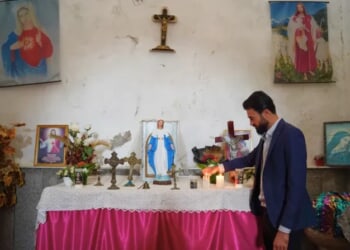As world leaders debate how to bring Russia’s brutal war in Ukraine to an end, and Washington weighs fresh aid packages and sanctions on Moscow, another crisis is quietly unfolding. More than 240,000 Ukrainian refugees temporarily admitted into the U.S. under the Biden-era Uniting for Ukraine (U4U) program are in a legal and political limbo. The situation is not only a humanitarian dilemma, but also a consequence of the Biden administration’s disastrous immigration and foreign policy.
[E]nding mass parole in the U.S. should be seriously considered. Executive discretion … cannot serve as a backdoor to rewrite immigration laws.
A recent Supreme Court decision allowed the Trump administration to terminate the Biden administration’s controversial Cuba, Haiti, Nicaragua, and Venezuela (CHNV) parole program, which granted temporary residence and work permits to otherwise inadmissible aliens for up to 2 years. Both U4U and the CHNV programs were established under the same legal authority: the executive’s humanitarian parole power, which Congress intended to be used on a case-by-case basis, not for mass admittance. Instead, the Biden administration abused it to construct a parallel immigration system outside of the Congressionally mandated framework. Given that the CHNV program was modeled after U4U, it’s only logical to ask, is U4U next?
The Trump administration stopped new enrollments into U4U in January and placed a pause on giving extensions soon after. Although a district court ordered the administration in June to resume processing extensions, the administration is expected to appeal the decision, leaving Ukrainians in limbo.
Washington is far from alone in facing this issue. The similarities with Europe are striking, but so are the differences. Both the U.S. and the EU only offered temporary status for Ukrainians fleeing the invasion, yet it is increasingly clear that many Ukrainians have no intention to return home. In a survey conducted in November-December 2024 for the Kyiv-based Centre for Economic Strategy (CES) only 43 percent of Ukrainian refugees in the West planned to return, with 49 percent in the U.S. wanting to do so. This is the first time in the history of this survey that this number dipped below 50 percent.
Yet, the number of actual returnees may be even lower than 43 percent if given the choice to remain after the fighting stops. CES estimates that under a pessimistic scenario only around 30 percent would return to Ukraine as refugees have integrated. Their economic situation has almost rebounded to pre-war levels on both sides of the Atlantic. But a host country’s temporary refuge does not equal permission for permanent resettlement.
In Europe, where the vast majority of Ukrainian refugees reside (5.1 million), governments have been cutting benefits. Meanwhile, the EU doesn’t have a plan offering a permanent solution. The Temporary Protection Directive (TPD), activated in March 2022, grants citizens and legal residents of Ukraine residency status for up to three years, bypassing ponderous asylum procedures. The three-year-mark came and went in March 2025 with the EU kicking the can down the road by extending TPD until March 2027. An EU-level strategic discussion has only been initiated recently. In the end — like with most migration-related issues — it may be up to the member states.
Still, there is one key difference between the U.S. and Europe: in Europe, there is a broad political and societal consensus that Ukrainians should be allowed to stay till the war ends. In Germany, which hosts the most Ukrainian refugees in the EU (1.2 million), even the hard-right AfD supports “the temporary admission of Ukrainian war refugees.” In Poland, hosting the second largest, 980,000-strong Ukrainian refugee population, even the ultra nationalist Grzegorz Braun went only as far as demanding the suspension of permanent residence permits and granting Polish citizenship to Ukrainians.
Although there’s no comprehensive plan in either country for the long-term future of Ukrainians, the policy discourse points in the “contribute and stay” direction. In Poland, a new, three-year-long temporary residence status will be available for Ukrainian TP beneficiaries present in Poland since March 2024 for at least a year — without the benefits of the original TP status. Following cuts in 2024, the governing centrist coalition’s candidate during the recent presidential election campaign proposed to link certain benefits to employment. President-elect Karol Nawrocki vowed to prioritize Polish citizens in access to social services.
In Germany, a similar trend is underway: Berlin is to exclude Ukrainians arriving after April 2025 from ‘citizens’ income’ (620 USD), and instead would provide benefits under the Asylum Seeker’s Benefits Act. The current 6.4 billion USD annual cost of ‘citizens’ income’ for 700,000 Ukrainians is a contentious topic. Moreover, 900,000 employable Ukrainian refugees are jobless despite having easy-access labor pathways offering more permanent status — but without refugee benefits.
Public opinion has been shifting too. In a February poll, 39 percent of respondents in Poland supported closing the border to additional refugees from Ukraine, while 61 percent supported sending them home once the war ends. In Germany, already in a May 2024 survey, only 33 percent of the respondents supported granting long term residency for Ukrainians.
Ultimately, the future of millions of Ukrainians cannot be left in ambiguity. Europe, with all its bureaucratic flaws, at least recognizes that mass returns are not viable during wartime. Still, ending mass parole in the U.S. should be seriously considered. Executive discretion, no matter how well-intentioned, cannot serve as a backdoor to rewrite immigration laws. The U.S. and Europe must confront the uncomfortable truth: while temporary refuge was necessary in the face of the war, indefinite and unclear displacement driven by political inertia serves no one — least of all Ukraine. The mass emigration of Ukrainians, if made permanent by default, risks becoming one of the war’s most devastating legacies. Ukraine will need its people back to rebuild itself. Reconstruction is doomed to fail without the return of a whole generation of professionals and young families now staying abroad.
READ MORE:
Why Trump Is Pissed Off at Putin
Monika Palotai is a Senior Fellow at the Religious Freedom Institute and an expert at the Warsaw Institute.
Kristof Gyorgy Veres is an Andrassy National Security Fellow at the Center for the National Interest and the international director of the Danube Institute.


![Former Bravo Star Charged After Violent Assault Using a Rock-Filled Sock in Tennessee Walmart [WATCH]](https://www.right2024.com/wp-content/uploads/2025/07/Former-Bravo-Star-Charged-After-Violent-Assault-Using-a-Rock-Filled-350x250.jpg)



![NYC Man Snatches Child Off The Sidewalk, Parents Chase Him Down [WATCH]](https://www.right2024.com/wp-content/uploads/2025/07/NYC-Man-Snatches-Child-Off-The-Sidewalk-Parents-Chase-Him-350x250.jpg)
![Karoline Leavitt Levels CNN's Kaitlan Collins and Other Legacy Media Reporters [WATCH]](https://www.right2024.com/wp-content/uploads/2025/07/Karoline-Leavitt-Levels-CNNs-Kaitlan-Collins-and-Other-Legacy-Media-350x250.jpg)
![Man Arrested After Screaming at Senators During Big Beautiful Bill Debate [WATCH]](https://www.right2024.com/wp-content/uploads/2025/06/Man-Arrested-After-Screaming-at-Senators-During-Big-Beautiful-Bill-350x250.jpg)

![Leftists Lose Their Minds After Jason Kelce Celebrates Being an American [WATCH]](https://www.right2024.com/wp-content/uploads/2025/07/Leftists-Lose-Their-Minds-After-Jason-Kelce-Celebrates-Being-an-350x250.jpg)





